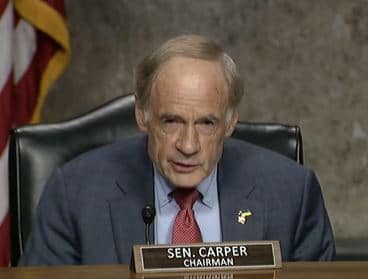Congress’ Despair Over Climate Change Makes Carbon Capture More Likely

WASHINGTON — The desperation wrought this summer by record heat and drought across parts of the United States were obvious during a Senate hearing Wednesday on how to capture and reuse greenhouse gases.
Only a few years ago, carbon capture technology was considered too impractical and expensive by government agencies to help them in the fight against climate change.
As predictions of crises become more dire, lawmakers and environmentalists are showing greater willingness to try the technology that recycles carbon dioxide pollutants instead of releasing them into the atmosphere.
“I can think of no greater challenge we face today as a planet and a nation than the climate crisis,” said Sen. Tom Carper, D-Del., chairman of the Senate Environment and Public Works Committee.
He was seeking suggestions from environmentalists on how to convert what was previously a fanciful hope for carbon capture technology into a major defense against global warming.
Prospects for winning government support and funding for the projects are warming as fast as the western states reporting the worst of wildfires, drought and heat warnings.
Nearly 700 Americans died of heat-related illnesses last year, Carper said. About 40% of southwestern states farmers were forced to sell at least part of their cattle herds as the animals became stressed from high temperatures and drought.
Carper said carbon capture, along with renewable energies like solar, wind, nuclear and hydrogen fuels, could provide a rescue.
“Together these technologies hold the key to saving our planet and creating good-paying jobs across our nation,” Carper said.
President Joe Biden joined in calls for innovative solutions as he spoke last week at the site of a former coal-burning power plant in Somerset, Massachusetts. He pledged $2.3 billion to fund communities’ defenses against climate change.
In addition, the Energy Department has set aside $6 billion from the bipartisan infrastructure law to invest in carbon capture technology. Energy Department officials said during a Carbon Negative Shot Summit virtual meeting last week that carbon capture could help them achieve their goal of net-zero emissions for the United States by 2050.
Carbon capture and utilization technologies pull in carbon dioxide from the atmosphere after it is emitted by industrial plants and automobiles. It is then converted through chemical processing into useful products, such as plastics, concrete or biofuel.
So far, the costs of the chemical processing have been prohibitive. As hope runs out for relief from climate change, governments worldwide show more tolerance for subsidizing it.
Sen. Shelley Moore Capito, R-W.Va., said the United States is “on the cusp of [the] revolutionary jump into deployment” of carbon capture technology.
Environmentalists who testified at the Senate hearing suggested giving the technology a push, such as by increasing the tax credit for industries under Section 45Q of the Internal Revenue Code. Congress approved the tax credit last year with the Carbon Capture, Utilization and Storage Tax Credit Amendments Act.
It offers corporations a tax credit that varies from just under $12 to as high as $50 for each metric ton of carbon captured and sequestered, depending on the kind of project. Proposals now in Congress could increase the credit to as high as $175 per ton.
Jason Albritton, a policy director for the nonprofit Nature Conservancy environmental group, said government incentives are crucial to increase the pace of implementing carbon capture technology.
“It takes resources and we have to invest in that,” Albritton said.
He also suggested outreach to communities that could host the projects to reduce the risk of political opposition and a streamlined government permitting process.
Brad Townsend, a vice president of the environmental group Center for Climate and Energy Solutions, said he was encouraged by carbon capture but said it was only one of many solutions needed for climate change.
“These technologies are not silver bullets,” he said about carbon capture.
They succeed “only if we rapidly decrease our dependence on fossil fuels,” Townsend said.
Tom can be reached at [email protected] and @TomRamstack
























